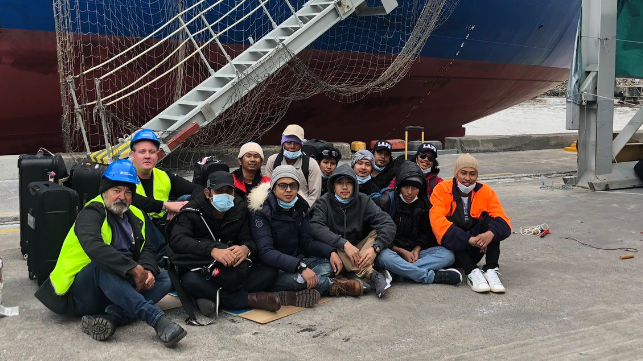Vatican Blasts Governments, Operators for Inaction on Seafarer Rights

The Vatican has once again weighted in on seafarers’ welfare by calling for the upholding of their safety, labor rights and human rights.
In a message ahead of the Sea Sunday on July 11, The Vatican has accused governments, shipping companies, crew agencies and international organizations of perpetuating or burying their heads on the sand as seafarers suffer due to COVID-19 pandemic-related disruption and their safety is put at risk by pirates.
“We appeal to ship owners, management companies, agents and recruiters to regard crewmembers as more than 'labor force' and remember that they are human beings. We urge the development of working practices, which are based on human dignity rather than profit, and so provide everything, which is necessary to improve the mental, physical and spiritual well-being of seafarers,” said Cardinal Peter K. A. Turkson, head of the Vatican’s Dicastery for Promoting Integral Human Development.
While COVID-19 has instigated significant disruptions, the global response to the plight of seafarers has largely been discriminatory and isolationism, something that has exacerbated adverse effects on their wellbeing, according to the Vatican.
In particular, despite repeated appeals from international organizations, unions, ship owners and faith-based groups for seafarers to be recognized as “essential workers” so that crew changes are expedited and vaccinations are prioritized, few countries have facilitated the movements and implemented a clear policy for seafarers’ vaccinations.
“Because of this pandemic, we would like to invite the maritime industry to learn to act as one by facilitating crew changes and vaccinations and strengthening the implementation of international standards to enhance and protect the human and working rights of the people of the sea,” noted Cardinal Turkson.
The Vatican’s hard hitting Sea Sunday message comes when the world maritime community is grappling with sensitive issues affecting seafarers including vaccination, crew change, labor rights, safety at sea among others.
Just this week, India’s Maritime Association of Shipowners Shipmanagers and Agents accused a section of hospitals in the country of denying seafarers COVID-19 vaccines.
According to The Vatican, the maritime industry that transports 90 percent of goods has endeavored to keep global trade flowing by transporting products including medication and medical equipment. This, however, has come at a great expense to the 1.7 million seafarers, some of whom have had to suffer hardships instigated by COVID-19 disruption, with some even opting to commit suicide.
It was estimated that in September 2020 some 400,000 seafarers who ought to have been repatriated were in fact stranded at sea because of COVID-19. In some cases seafarers have not been able to go home for 18 months.
Apart from COVID-19, piracy is another major challenge for seafarers, with 38 piracy incidents reported this year. This includes 33 vessels boarded, two attempted attacks, two vessels fired upon and one vessel hijacked.
To deal with the scourge of piracy, The Vatican is calling on governments and international organizations to determine long-lasting solutions. “Moreover, ship-owners should adopt all requisite preventative measures to ensure the safety not only of ships and their cargo, but especially that of seafarers,” observed Cardinal Turkson.
The Vatican also called for an end to ship abandonments, demanding the full implementation of the new obligations under the Maritime Labor Convention (MLC 2006) that was adopted in 2014 and entered into force in 2017.

that matters most
Get the latest maritime news delivered to your inbox daily.
Under the convention, shipowners are required to have compulsory insurance to cover abandonment at sea, to pay for expenses including food, drinking water, medical care and repatriation costs.
There has been a significant increase of ship abandonments from 40 in 2019 to 85 in 2020, according to the International Transport Workers Federation.
